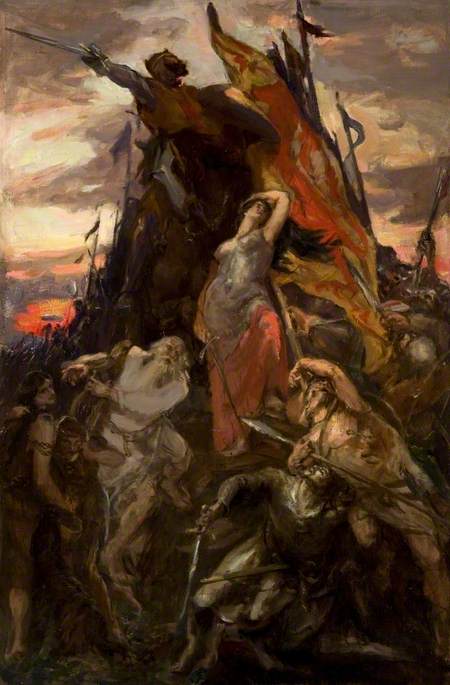As Scotland looks ahead to a national referendum on separation from Great Britain in a little over a week, I’ve seen multiple references to Robert Burns’ well-known poem “Robert Bruce’s Famous March to Bannockburn,” more popularly known as “Scots Wha Hae.” The New York Times Paul Krugman, arguing that independence would be economically crazy as Scotland risks becoming like Spain, titled his column, “Scots, What the Heck?”
The poem was inspired by a visit that Robert Burns made to the site of the Battle of Bannockburn in 1787. He wrote in his journal,
Came on to Bannockburn: the hole in the stone where glorious Bruce set his standard. Here no Scot can pass uninterested. I fancy to myself that I see my gallant heroic countrymen, coming o’er the hill and down upon the plunderers of their country, the murderers of their fathers; noble revenge and just hate glowing in every vein, striding more and more eagerly as they approach the oppressive, insulting, and bloodthirsty foe! I see them in gloriously-triumphant congratulation on the victorious field, exulting in their heroic royal ardor, and rescued liberty and independence!
The French Revolution came between that visit and the date of the poem’s composition, further firing Burns’ imagination. Burns wrote to his publisher of being inspired by “‘glorious struggle for Freedom, associated with the glowing ideas of some other struggles of the same nature, not quite so ancient.” These other struggles were those of various radical Scots, who longed for a second Bannockburn.
England, however, reacted to France’s revolution by cracking down on independence movements, sentencing one radical Scottish leader to 14 years of transportation to Australia. Therefore, according to Wikipedia, Burns played it safe, agreeing to allow his publishers to publish his poem “as a thing they have met with by accident, and unknown to me.”
Bannockburn
By Robert Burns
At Bannockburn the English lay,–
The Scots they were na far away,
But waited for the break o’ day
That glinted in the east.
But soon the sun broke through the heath
And lighted up that field of death,
When Bruce, wi’ saul-inspiring breath,
His heralds thus addressed:–
“Scots, wha hae wi’ Wallace bled–
Scots, wham Bruce has aften led–
Welcome to your gory bed.
Or to victorie!
“Now’s the day, and now’s the hour;
See the front o’ battle lower;
See approach proud Edward’s power–
Chains and slaverie!
“Wha will be a traitor knave?
Wha can fill a coward’s grave?
Wha sae base as be a slave?
Let him turn and flee!
“Wha for Scotland’s king and law
Freedom’s sword will strongly draw,
Freeman stand or freeman fa’–
Let him follow me!
“By Oppression’s woes and pains!
By your sons in servile chains!
We will drain our dearest veins,
But they shall be free!
“Lay the proud usurpers low!
Tyrants fall in every foe!
Liberty’s in every blow!
Let us do or die!”
Now, 220 years later, Scotland will vote whether to lay the proud usurpers low. Or, in the minds of some, commit economic suicide. The day and the hour will be September 18, 2014. Stay tuned.


